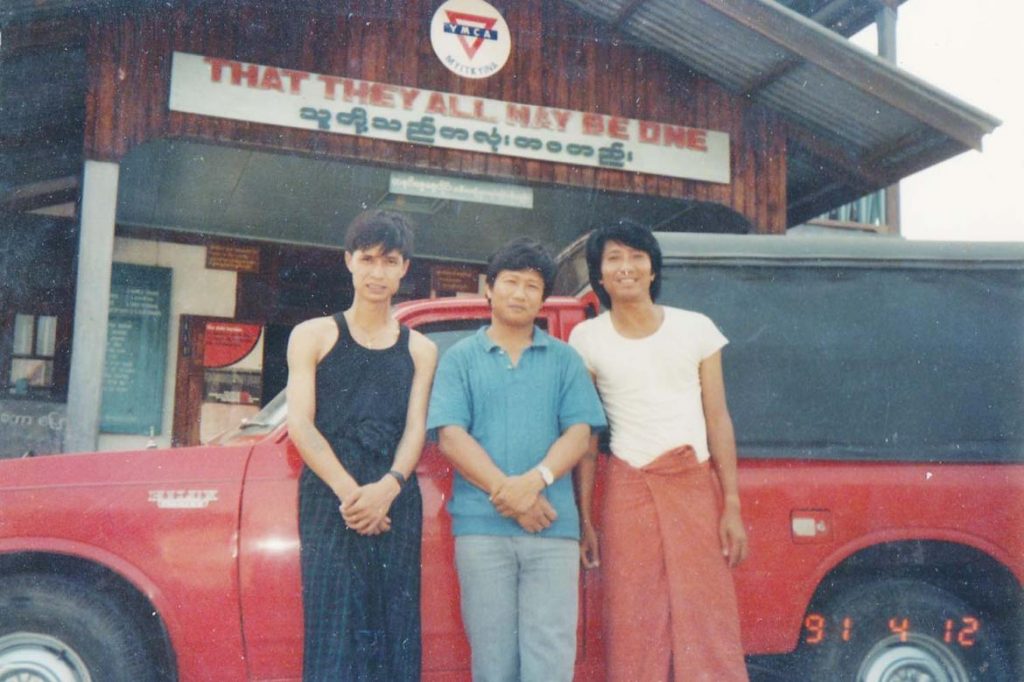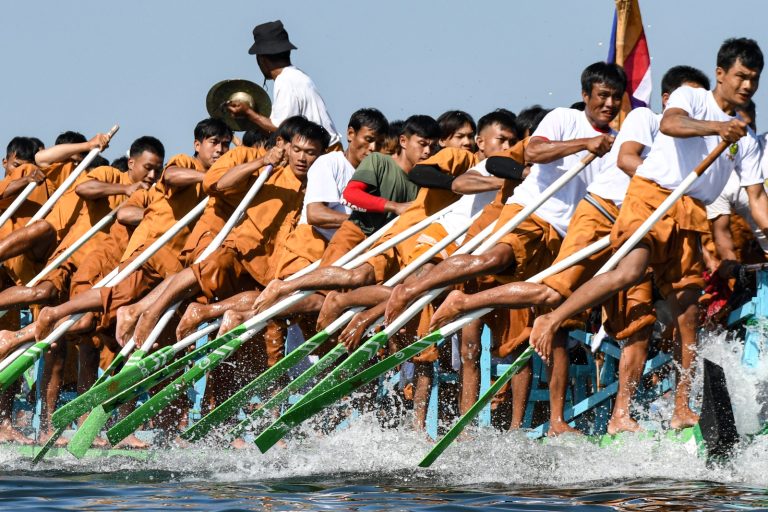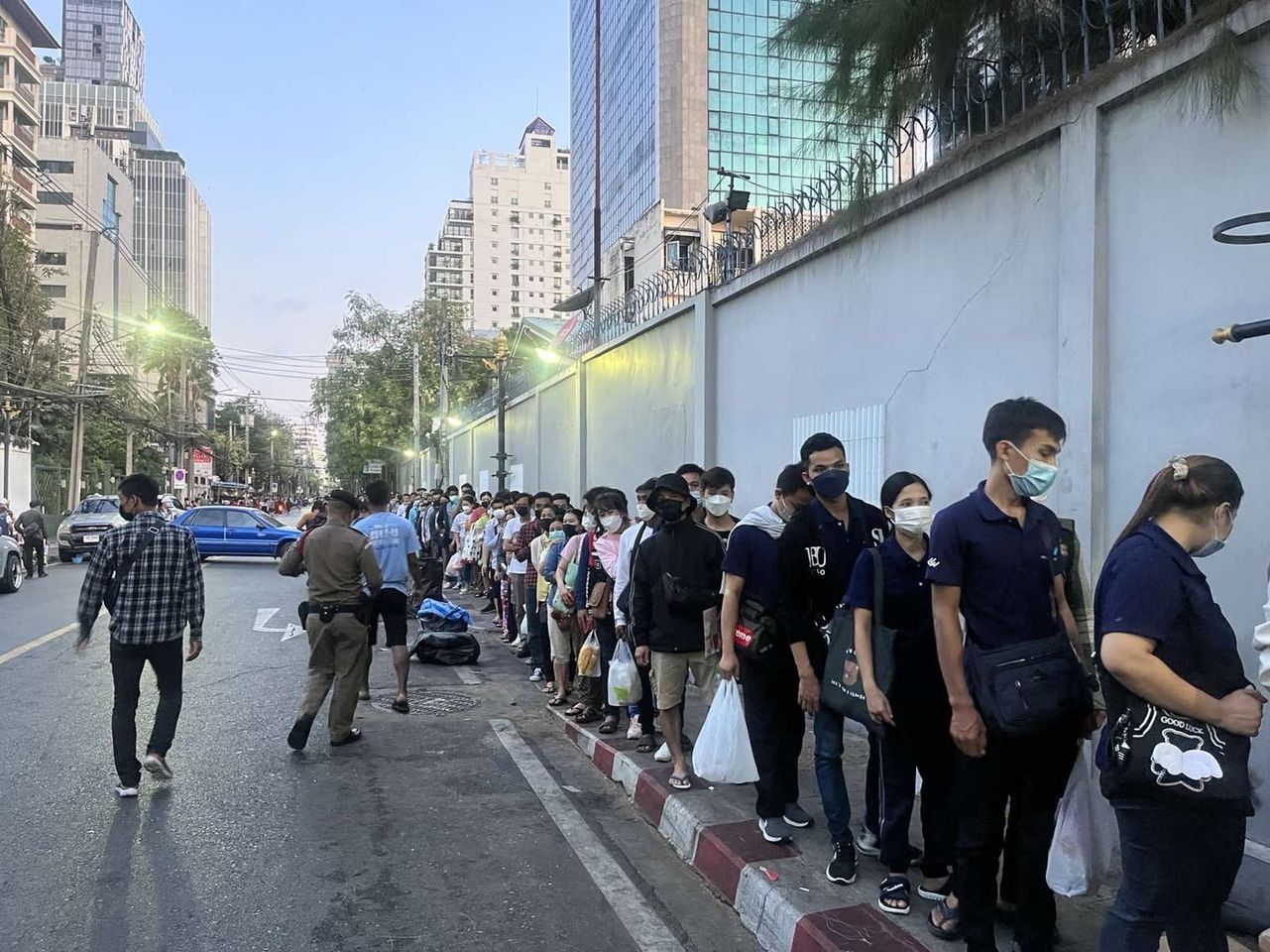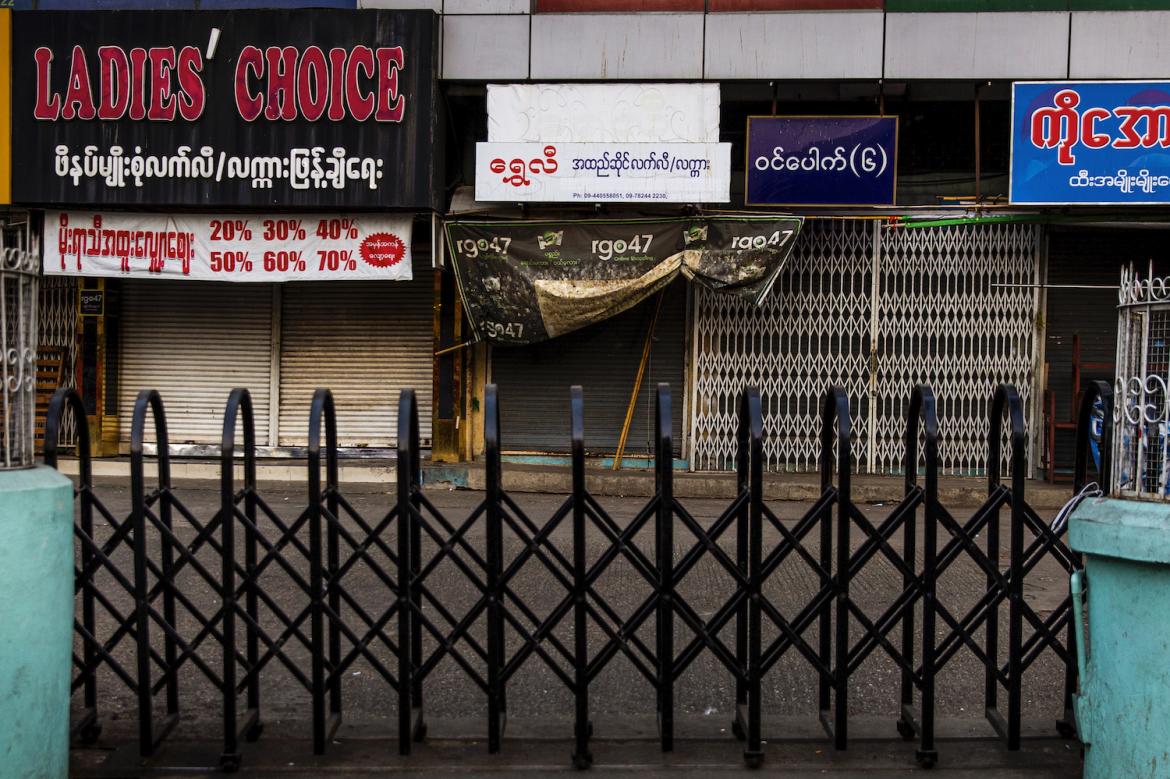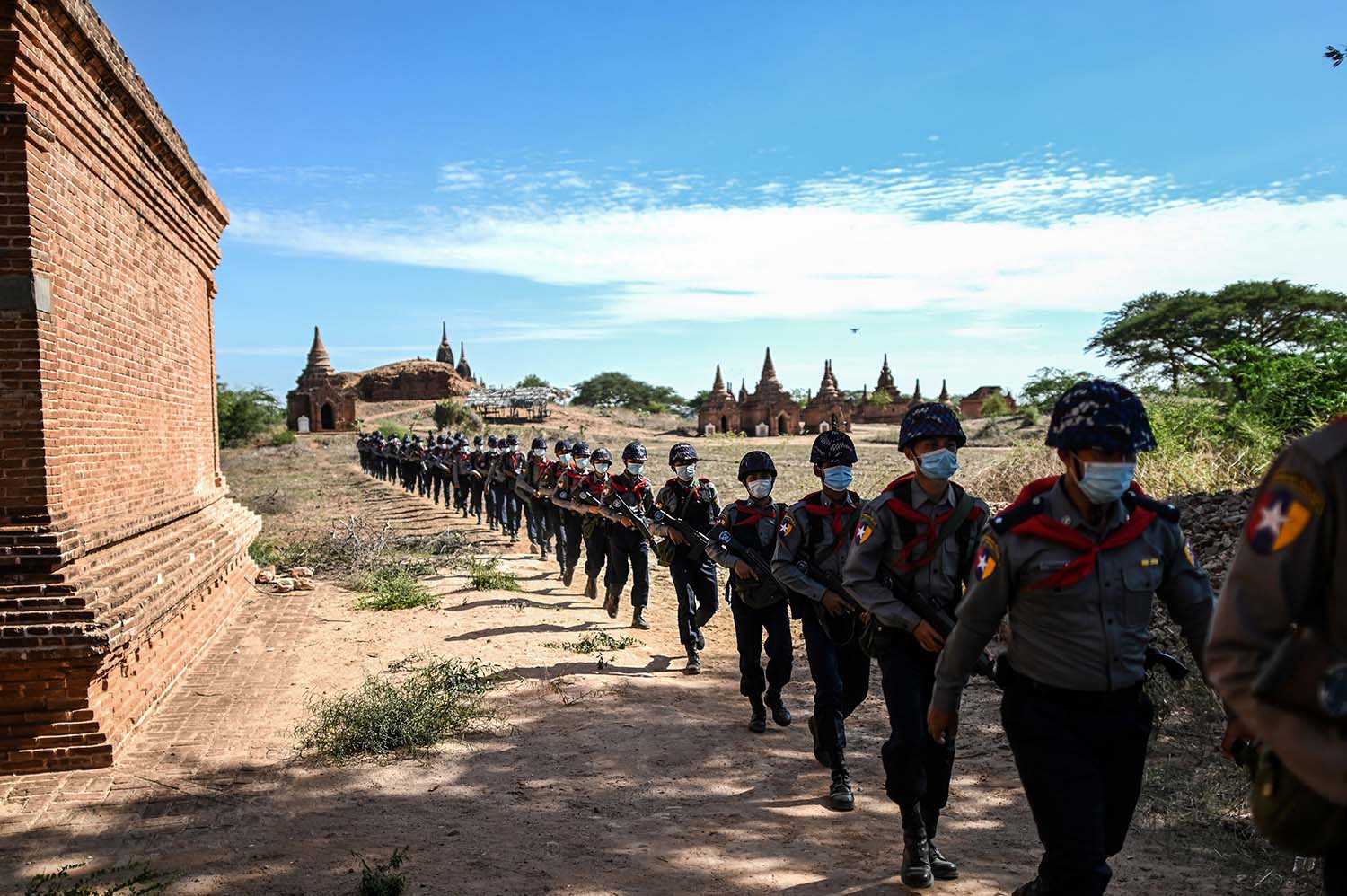Sumlut Gun Shawng has devoted nearly 40 years to making the Myitkyina YMCA one of the city’s best appreciated and most innovative community service organisations.
By EMILY FISHBEIN | FRONTIER
IT’S EASY to miss the old, faded-white cement building in downtown Myitkyina that serves as the city’s Young Men’s Christian Association. The building has not been upgraded since 1999, but this should not be interpreted as a lack of appreciation for what it offers. Nestled within its walls is the rich history of a community centre that has served as a landmark in the Kachin State capital, providing the first community-based library, English classes, fax machine, computers and internet during military rule.
When the YMCA was founded in London in 1844, its aim was to provide low-cost accommodation for rural youth moving to cities towards the end of the Industrial Revolution. Today, it has a headquarters in Geneva, a presence in 120 countries and territories, and has served an estimated 64 million people through its lodging, educational and recreational activities for youth.
The first YMCA in Burma opened in Rangoon in 1897. Because most of its activities served the British colonial elite, the national YMCA in Burma was initially regarded by many as a Western institution that did not relate to Burmese youth.
In Myitkyina, though, it has been a different story. It was the fifth YMCA to open in Myanmar, in 1955, and after a slow start it has managed to live up to its goal of empowering youth to create a more just, peaceful and developed society.
Support more independent journalism like this. Sign up to be a Frontier member.
Although the YMCA is a Christian organisation, its mission in Myanmar includes promoting the inclusion of all communities, regardless of race, religion, gender or culture. The Myitkyina YMCA’s 15-member board includes Kachin, Kayin, Bamar and Sino-Bamar from a range of backgrounds, including religious leaders from different Christian denominations, a retired civil servant, and a lawyer. Executive secretary Shadau Khon Mai told Frontier that programme participants also come from diverse ethnic and religious backgrounds and include Christians, Buddhists and Muslims.
At the national level, the YMCA’s mission statement includes working in solidarity with the vulnerable and marginalised towards an equal society, promoting cultural dialogue, and protecting the natural environment. There are 15 YMCAs in Myanmar and a further 15 “associate” YMCAs that provide some programmes but are not full members of the national council.
The Myitkyina YMCA was established by Kumzje Tawng, who had been a deputy commissioner under the British colonial administration. In 1955, he collected small donations and borrowed money to buy a plot of land for K45,000. After the military seized power in 1962, the YMCA’s activities in Myitkyina were dormant for 18 years until Kumzje Tawng recruited the current general secretary, Sumlut Gun Shawng, in 1980.
Gun Shawng, a recent university graduate, had moved to Myitkyina from Bhamo to expand his karate training business. A legendary instructor, Gun Shawng claims to have trained more than 6,000 youth, including the Kachin Independence Organization’s vice-chairman, General Sumlut Gun Maw, and the chief intelligence officer with the Ministry of Home Affairs’ Special Branch in Myitkyina.
When Gun Shawng started in his new role, the YMCA was “nothing, just a piece of land”. There were no funds to support his position for the first five years, so he worked as a volunteer, using his earnings from teaching karate to survive.

The YMCA was the first place in Myitkyina to host foreign tourists and even welcomed its first guest months before the ban on foreign tourists was lifted. (Emily Fishbein | Frontier)
Then, in 1984, the West German government donated the equivalent of about K500,000 towards the cost of building a hostel. There were difficult moments at the opening ceremony in June 1986 when some of the people from whom Kumzje Tawng had borrowed money from nearly three decades earlier attended and asked for their money back. “It was a headache,” recalled Gun Shawng.
He persevered, launching Myitkyina’s first youth leadership programme in 1986, and opening a library in 1990, one of the first with English language books that was open to the general public. A year later, he organised the city’s first English conversation club and began offering vocational training. Myitkyina was still off-limits to foreign travellers then but Gun Shawng had the foresight to invite trainers from Yangon to train hostel staff in hotel management and hospitality.
In 1993, Gun Shawng was offered the position of national general secretary of the YMCA, but declined when his mentor, Kumzje Tawng, told him that accepting would mean the collapse of the Myitkyina YMCA. Gun Shawng made a promise to serve as general secretary of the Myitkyina YMCA for the rest of his career. Kumzje Tawng died in 1995 but Gun Shawng has kept his promise.
According to Gun Shawng, the first known foreign visitor to Myitkyina during military rule was a German tourist who travelled to the city in November 1993, five months before it officially opened to foreigners. “I will always remember him. … His hair was a different colour from ours,” Gun Shawng recalled. “I don’t know how he got here, why he was allowed to board the train to Myitkyina.”
The foreigner was shunned in Myitkyina, so Gun Shawng offered him a place to stay. “The whole night I couldn’t sleep – so many people were calling me and bothering me about it. But he stayed. [The police] didn’t dare to touch him.”
In February 1994, the Tatmadaw and Kachin Independence Organisation signed a ceasefire agreement that would end armed conflict in Kachin for 17 years. In April 1994, the government opened Myitkyina to foreign visitors and granted the YMCA the first licence to accommodate them. Guests in those years included the ambassadors of the United States and Britain. The YMCA’s activities were monitored and Gun Shawng said he faced a “lot of problems” because foreign guests attracted the attention of government intelligence agents, who asked endless questions.
“They asked, ‘When did [the guests] wake up? What did they eat for breakfast? When did they take lunch? Where did they eat dinner? What photos did they take?’ How was I supposed to know? It was a big problem but we needed to be patient.”
Eager to modernise the YMCA, in 1995 Gun Shawng used his own money to buy six computers in Yangon, which he says were the first computers in Kachin State, and he launched a computer training course. In 1997, he received government permission to connect his computers to the internet, he said, further bringing the modern world to Kachin. The same year he bought a laptop and fax machine to the state. Because the fax was so rare, once it was licensed he could use it to generate income, charging a premium to send faxes and emails and using the funds to support the YMCA’s operations.

Sumlut Gun Shawng (far right) with some of his karate students in Myitkyina around 1979. (Supplied)
By this time, Gun Shawng was so involved in the YMCA that he had ceased teaching karate. Over the next 18 years, he and his staff trained more than 2,000 people to use computers. But in 2015 Gun Shawng decided to stop the training courses, he said, because they seemed outdated.
Myitkyina YMCA’s current activities include vocational training and courses in income-generation, with many targeted at internally displaced persons and other vulnerable groups. As well as the English conversation club, the YMCA also runs English courses for children, reading groups, a theatre club, and a range of health and fitness activities, including karate, yoga and Zumba.
The YMCA is supported by eight staff, two interns and six volunteers. Four of the staff, including Khon Mai, have been with the YMCA for more than nineteen years.
“I really believe in my work,” she told Frontier. “I love learning about youth psychology, being creative, and building a close and diverse community. I can freely develop ideas here.”
In recent years, some well-appointed hotels have opened in Myitkyina, but the YMCA made a deliberate decision not to upgrade. Gun Shawng is proud of the YMCA’s reputation for providing basic, affordable and reliable accommodation.
“We don’t have the best facilities, but we value security and privacy. Visitors understand this is a developing country. They want to save their money here, and we are very cheap,” he said. At US$10 a night, the YMCA offers clean, basic rooms with a shared bathroom, shared kitchen and outdoor common area. For an extra $5, guests may upgrade to a room with a private bathroom and hot water.
Gun Shawng is 65 and although he wants to retire has agreed to stay on for another four years while the YMCA finds a new general secretary. He is the longest serving of any YMCA employee in Myanmar, after the national general secretary. Gun Shawng says his younger staff, interns and volunteers keep him inspired and energised.
“Young people have creative minds and fresh thinking,” he said. “I never disturb my young staff. Young people think freely and dare to do new things.”


